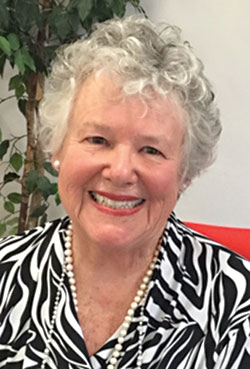
by Mary Wakefield Buxton –
URBANNA — Looking back, the 1950s was a time in our country where many teenagers saw the world through rose-colored glasses. Innocent yes, but we were also wrapped up so much in our own lives that we did not see any of the dark side of society.
At age 14 I believed that school was there to entertain us each day and the teachers had been hired to amuse us. I worked very little and laughed at most everything they said.
But at age 16 I began to see school was important and I began to study. I also noticed more of what was going on around me. Noticing obvious wrongs and injustices in the world caused me great teenage angst.
Reading Shakespeare’s plays in high school helped trigger better understanding of causes of human anguish. I saw how foolish was the behavior of Romeo and Juliet which led to their tragic young deaths. I saw Macbeth’s blind ambition, his wife’s cunning scheme to murder the king so her husband could take the throne and in “Julius Caesar” I saw murderous scheming and unbridled lust for power of those who control government. It seemed to me our human weaknesses… pride, greed, anger, envy, ambition, lust… triggered our demise.
My eyes began to open to other unpleasant realities. My first realization of inequality came one day while walking with a girlfriend to lunch in the school cafeteria. Suddenly my girlfriend cried out. She had spotted her last year’s coat on another student. “My mother gave it to Catholic charities,” she whispered. We walked in silence as each of us processed this fact in our teenage brains.
It was painful, this discovery. It meant things were not equal in our world. Some were born into more fortunate families than others. It shocked me to think so much of what we had been given at birth depended on a sort of a “luck of the draw.”
It was more than economic security. Our parents also passed on levels of motivation, intelligence, health, speech, values, goals, even such matters as good manners and grammar, even personality traits such as curiosity, perseverance, a sense of humor and a positive attitude — traits that would lead to success in life — it seemed everything depended on the luck of the draw.
There were other painful lessons learned. I noticed we lived within our own groups or “cliques,” as they were called at the time. We sat with our own kind, studied with each other, ate lunch together and met each other for after-school activities. But why did we travel in our own “packs,” rather like wild wolves, why did we not mingle with others?
More unfairness unfolded. In my senior year a classmate got pregnant or was “knocked up” as the saying was in those days. Ohio public schools allowed pregnant students to stay in school as long as possible and we watched our classmate as she struggled, becoming so heavy in the end she could hardly walk down the halls carrying her books.
It was so unfair that she alone must suffer her fate for there was no sign of a boyfriend in a time when there was no legal abortion. I saw she was destined by one mistake to possibly live with her child in a life of poverty.
Then my high school sorority that I thought at the time was important to be invited to join. My sister, Alice, was president that year so I had no trouble being accepted. But one of my girlfriends was not. She had been “blackballed,” as it was called in those days, over a boyfriend issue. It upset me that someone would exclude another person. The realization that some people would use whatever power they wielded to keep another person down was … jolting.
Two years later I became president of the club and I saw to it my friend got an invitation to join. She declined. I respected her because she was clearly above the usual high school mentality.
In 1959 there were no guidance counselors. At the time most girls that went on for higher education planned to be a teacher or nurse. Women in my family had been wives, mothers and homemakers but one aunt was an MD, a very rare thing in the 1950s. She mentioned to me that I might be interested in medicine.
Today very few girls graduate from high school without awareness that they must prepare themselves for a career and possibly support themselves and others for their entire lives. But that wasn’t how it was in the ’50s. My parents never spoke about having a profession beyond love, marriage and a family.
Like millions of females raised in the ’50s in America I was expected to marry well and, be a good wife, mother and homemaker just as all my female ancestors had been. “True happiness for a woman comes through love, marriage and children,” I remember Mother telling me. Which I am sure her mother told her. But by my senior year I chose to attend a woman’s college in Virginia determined to pursue an intellectual life and receive the best liberal art education possible.
High school is a time to begin finding out what kind of person we are and to form lifetime values. It is also a time to grow up. Even though the human brain is not fully developed until the 20s or so, high school is the beginning of the miraculous change from child to adult.
I arrived in Lynchburg in the fall of 1959, still 17 years old, to join all-white classmates from prominent southern families throughout the south. There, a teenage girl raised in small town, Ohio, with her still developing young brain, was introduced to a startling new world: 300 years of a slave society, the traditions of antebellum south, Civil War and the “Jim Crow” era.
Within a year of my arrival several Randolph Macon Woman’s College seniors were jailed for participating in a civil rights sit-in demonstration in a downtown store. I remember the shock of seeing the headlines in the morning newspaper showing my fellow students behind bars.
Times changed overnight. The more innocent earlier times of the ’40s and ’50s were over. The ’60s had begun a new era that not only introduced the drug and anti-war culture to the nation, but found us enmeshed in the Vietnam War, demanded equal civil rights for all Americans regardless of race or gender and questioned family values, sexual behavior, gender roles and even century old religious beliefs that continue on to this day.
Yes, the “over 80 club” in America grew up in a time that could only be called “the calm before the storm.” And the storm is still upon us. Conclusion.
©2022
(Note: Mary will be taking a few weeks off from writing her column for a much-needed rest. She is a member of the over 80 club.)



